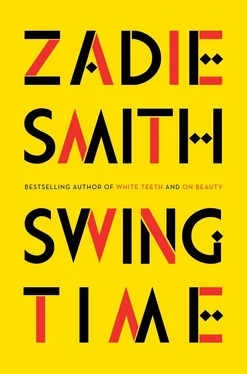• • •
I think of how Rakim gathered his information back then: in the public libraries, in the college archive, doggedly reading old newspapers, examining microfiche, following footnotes. And then I think of him now, in the age of the internet, and how perfectly happy he must be, or else how consumed, to the point of raving madness. Now I can find out myself in a moment the name of that captain and can learn in the same click what he thought of the girl he gifted to a queen. Since her arrival in the country, she has made considerable progress in the study of the English language and manifests great musical talent and intelligence of no common order. Her hair is short, black, and curling, strongly indicative of her African birth; while her features are pleasing and handsome, and her manners and conduct most mild and affectionate to all about her. I know now that her Yoruba name was Aina, meaning “difficult birth,” a name you give to a child who is born with her umbilical cord tied round her neck. I can see a photo of Aina in her high-necked Victorian corsetry, with her face closed, her body perfectly still. I remember that Rakim had a refrain, always proudly declaimed, with his overbite pulled back over his teeth: “We have our own kings! We have our own queens!” I would nod along for the sake of peace but in truth some part of me always rebelled. Why did he think it so important for me to know that Beethoven dedicated a sonata to a mulatto violinist, or that Shakespeare’s dark lady really was dark, or that Queen Victoria had deigned to raise a child of Africa, “bright as any white girl?” I did not want to rely on each European fact having its African shadow, as if without the scaffolding of the European fact everything African might turn to dust in my hands. It gave me no pleasure to see that sweet-faced girl dressed like one of Victoria’s own children, frozen in a formal photograph, with a new kind of cord round her neck. I always wanted life — movement.
• • •
One slow Sunday Rakim blew some smoke out of his mouth and started talking about going to see a “real film.” It was French, playing at the college film society that same day, and over the course of the morning we had steadily torn apart a flyer for it, using the glossy card to make many little roaches for our joints. But you could still make out the face of a brown girl in a blue headscarf who, Rakim now claimed, had something of my features, or I had hers. She was staring directly at me with what was left of her right eye. We dragged ourselves across campus to the media room and sat in the uncomfortable fold-up chairs. The film started. But with the fog in my head it was quite hard to understand what I was watching, it seemed to be made out of many little pieces, like a stained-glass window, and I did not know which parts were important or on what scenes Rakim felt I should focus, although maybe everyone in the room felt the same, maybe it’s part of the effect of that film that each viewer should see something different in it. I can’t say what Rakim saw. I saw tribes. Many different tribes, from every corner of the world, operating under the internal rules of their groups and then edited together in a complex pattern that appeared to have, in the moment, its own weird logic. I saw Japanese girls in traditional costume, dancing in formation, making strangely hip-hop movements on their elevated geta . Cape Verdeans waiting with perfect, timeless patience for a boat that may or may not come. I saw white-blond children walking down an otherwise deserted Icelandic road, in a town painted black by volcanic ash. I heard a dubbed and disembodied woman’s voice speak over these images, she was contrasting African time to the time of Europe and time as it is experienced in Asia. She said that a hundred years ago mankind was confronted with the question of space, but that the problem of the twentieth century was the simultaneous existence of different notions of time. I looked over at Rakim: he was making notes in the darkness, hopelessly stoned. It got to the point where the images themselves were too much for him, he could only listen to the woman’s voice and make his notes, faster and faster as the film went on, until he’d written half the script out in his pad.
For me the film had no beginning or end, and this was not an unpleasant sensation, just a mysterious one, as if time itself had expanded to make space for this infinite parade of tribes. On and on it went, refusing to end, there were parts I admit I slept through, only to awaken sharply when my chin hit my chest, at which point I would look up and find myself confronted with a bizarre image — a temple consecrated to cats, Jimmy Stewart chasing Kim Novak up a spiral staircase — images made all the more alien because I hadn’t followed what came before and would not see what came after. And in one of these lucid gaps between waking up and falling asleep I heard once more that same disembodied voice speak of the essential indestructibility of women, and of men’s relation to it. For it is the job of men, she said, to stop women from realizing their own indestructibility, and for as long as possible. Each time I woke with a start I could feel Rakim’s impatience with me, his need to correct me, and I began to fear the closing credits, I could imagine the exact intensity and length of the argument that would follow them, in that dangerous moment when we were out of the cinema, back in his room and far from witnesses. I never wanted that film to end.
• • •
A few days later I dumped Rakim, in a cowardly way, in the form of a letter, slipped under his door. In it I blamed myself and said I hoped we could be friends, but he sent me one back, in livid red ink, informing me he knew that I was in the ten percent, and that from now on he would be on his guard against me. He was as good as his word. For the rest of my college life he would turn on his heel if he saw me coming, cross the street if he spotted me in town, leave any lecture room I entered. Two years later, at graduation, a white woman hurried across the hall and grabbed my mother’s sleeve, and said, “I thought it was you — you’re an inspiration to our young people, you really are — but I’m so glad to meet you! And this is my son.” My mother turned around with her face already fixed in an expression I knew rather well by then — gentle condescension mixed with pride, the same face she often had now when on television, whenever she was called upon to “speak for those who had no voice.” She put out her hand to greet this white woman’s son, who would not at first come out from behind his mother and when he did looked at the ground, his skinny dreads obscuring his face, though I knew him at once by his Converse All Stars, poking out from beneath his graduation gown.
Two
On my fifth visit, I went alone. Strode straight through the airport, out into the heat, feeling a glorious competency. To my left, to my right, were the lost and the wary: beach-bound tourists, evangelicals in their oversized T-shirts and all the serious young German anthropologists. No representative led me to my vehicle. I was not waiting for “the rest of my party.” I had my coins ready for the cripples in the car park, my cab fare already tucked in the back of my jeans, my half a dozen phrases. Nakam! Jamun gam? Jama rek! Khakis and crumpled white linen long gone. Black jeans, a black silk shirt and big gold swinging hoops in my ears. I believed I’d mastered local time. I knew now how long it took to get to the ferry and at what time of day, so that when my cab pulled up to the gangway hundreds of other people had already done my waiting for me, all I had to do was get out of the car and walk right on board. The ship lurched from the shore. On the top deck the sway pitched me forward, through two layers of people up to the barrier, and happy to be there, like someone just then pushed into their lover’s arms. I looked down at all the life and movement below: jostling people, squawking chickens, dolphins leaping in the foam, narrowboats reeling in our wake, half-starved dogs running along the shoreline. Here and there I spotted what I knew now to be the Tablighi, their short trousers flapping around their ankles, because if they were longer they would get dirty, and the prayers of the dirty don’t get answered, so you end up burning your feet in hell. But beyond their dress it was really their stillness that marked them out. Amid all that activity they looked paused, either reading from their prayer books or sitting in silence, often with their kohl-rimmed eyes closed and a blissful smile nestled in their henna-stained beards, so peaceful compared to the rest of us. Dreaming of their pure and modern iman maybe: of small, nuclear families worshipping Allah in discreet apartments, of praise without magic, of direct access to God without local intermediaries, of sterilized hospital circumcisions, babies born without any celebratory dancing, women who did not think to pair a hot-pink hijab with a lime-green Lycra minidress. I wondered how hard it must be to maintain this dream, right now, on this ferry, as the unruly everyday faith unfolded all around them.
Читать дальше












